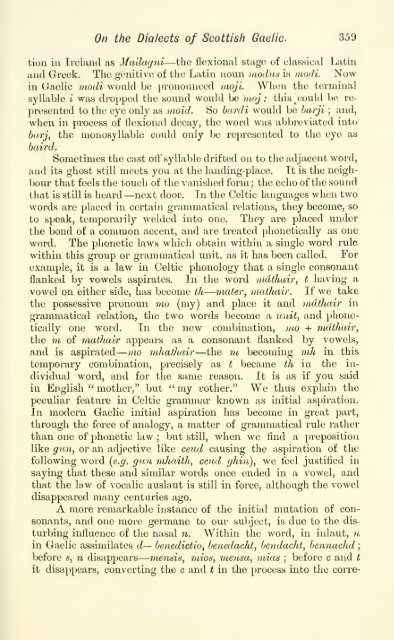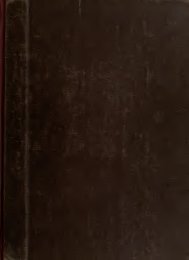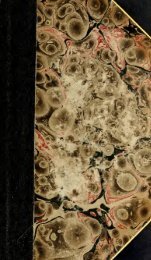- Page 1:
OF THx:;- GAELIC SOCIETY OF INVERNE
- Page 5:
TRANSACTIONS OF THE GAELIC SOCIETY
- Page 9 and 10:
coisrTEisrTS PAGE, Office-bearers f
- Page 11 and 12:
GAELIC SOCIETY OF INVERNESS. OFFICE
- Page 13 and 14:
GAELIC SOCIETY OF INVERNESS. CONSTI
- Page 15:
COXSTITUTION. XI G. The Society sha
- Page 18 and 19:
XIV INTRODUCTION. translation of th
- Page 20 and 21:
XVI INTRODUCTION. The above scheme
- Page 22 and 23:
2 Gaelic Society of Inuerness. —
- Page 24 and 25:
4 Gaelic Society of Inverness. leun
- Page 26 and 27:
6 Gaelic Society of Inverness. —
- Page 28 and 29:
8 Gaelic Society of Inverness. bhur
- Page 30 and 31:
10 Gaelic Society of Inverness. mai
- Page 32 and 33:
12 Gaelic Society of Inverness. " '
- Page 34 and 35:
14 Gaelic Society of Inuerness. Cal
- Page 36 and 37:
16 Gaelic Society of Inueniess. Gra
- Page 38 and 39:
— 18 Gaelic Society of Inverness.
- Page 40 and 41:
20 Gaelic Society oj Inuerness. Chu
- Page 42 and 43:
22 Gaelic Society of Inverness. pat
- Page 44 and 45:
24 Gaelic Society of Inverness. bri
- Page 46 and 47:
26 Gaelic Society of Inverness. see
- Page 48 and 49:
28 Gaelic Society of Inuerness. dio
- Page 50 and 51:
— — — •"^O Gaelic Society o
- Page 52 and 53:
32 Gaelic Society of itweniess. L;i
- Page 54 and 55:
34 Gaelic Society of Inverness. foo
- Page 56 and 57:
— — 36 Gaelic Society of Invern
- Page 58 and 59:
38 Gaelic Society of Inueniess. Lat
- Page 60 and 61:
40 Gaelic Society of Inverness. TRE
- Page 62 and 63:
42 Gaelic Society of Inverness. Bla
- Page 64 and 65:
44 Gaelic Society of Inverness. Hav
- Page 66 and 67:
46 Gaelic Society of fnueniess. HOO
- Page 68 and 69:
— — is Gaelic Socifty of Invern
- Page 70 and 71:
50 Gaelic Society of Inverness. Lat
- Page 72 and 73:
— 52 Gaelic Society of Inverness.
- Page 74 and 75:
54 Gaelic Society of Inverness. —
- Page 76 and 77:
56 Gaelic Society of Inuerness. Lat
- Page 78 and 79:
— 58 Gaelic Society of Inuerness.
- Page 80 and 81:
60 Gaelic Society of Inueniess. try
- Page 82 and 83:
— 62 Gaelic Society of Inverness.
- Page 84 and 85:
64 Gaelic Society of Inverness. Lat
- Page 86 and 87:
66 Gaelic Society of Inuerness. The
- Page 88 and 89:
68 Gaelic Society of Inuerness. —
- Page 90 and 91:
— — 70 Gaelic Society of Invern
- Page 92 and 93:
— — 72 Gaelic Society of Invern
- Page 94 and 95:
— — — 74 Gaelic Society of In
- Page 96 and 97:
76 Gaelic Society of Inverness. Loc
- Page 98 and 99:
— — — 78 Gaelic Society of In
- Page 100 and 101:
80 Gaelic Society of Inueniess. h\x
- Page 102 and 103:
82 Gaelic Society of Inverness. Lat
- Page 104 and 105:
— 84 Gaelic Society of Inverness.
- Page 106 and 107:
86 Gaelic Society of Inverness. kin
- Page 108 and 109:
88 Gaelic Society of Inverness. Lat
- Page 110 and 111:
90 Gaelic Society of Inverness. a m
- Page 112 and 113:
92 Gaelic Society of Inverness. Of
- Page 114 and 115:
94 Gaelic Society of Inuerness. 23r
- Page 116 and 117:
96 Gaelic Society of Inuerness. glo
- Page 118 and 119:
98 Gaelic Society of Inverness. " A
- Page 120 and 121:
100 Gaelic Society of Inverness. up
- Page 122 and 123:
102 Gaelic Society of Inverness. in
- Page 124 and 125:
104 Gaelic Society of Inverness. mi
- Page 126 and 127:
106 Gaelic Society of Inuerness. Mr
- Page 128 and 129:
108 Gaelic Society of Inverness. am
- Page 130 and 131:
110 Gaelic Society of Inuerness. of
- Page 132 and 133:
— 112 Oaelic Society of Inuerness
- Page 134 and 135:
114 Gaelic Society of Inverness. Gu
- Page 136 and 137:
116 Gaelic Society of Inverness. Gu
- Page 138 and 139:
— 118 Gaelic Society of Inverness
- Page 140 and 141:
130 Gaelic Society of Inuerness. Ma
- Page 142 and 143:
122 Gaelic Society of Inuerness. Ex
- Page 144 and 145:
124 Gaelic Society of Inverness. Ma
- Page 146 and 147:
126 Gaelic Society of Inverness. Gn
- Page 148 and 149:
128 Gaelic Society of Inverness —
- Page 150 and 151:
130 Gaelic Society of Inverness. Ma
- Page 152 and 153:
l32 Gaelic Society of Inuerness. Th
- Page 154 and 155:
134 Gaelic Society of Inverness. Th
- Page 156 and 157:
— 136 Gaelic Society of Inucrness
- Page 158 and 159:
138 Gaelic Society of Inverness.
- Page 160 and 161:
140 Gaelic Society of Inverness. Ac
- Page 162 and 163:
142 Gaelic Society of Inverness. Tl
- Page 164 and 165:
144 Gaelic Society of Inverness. Fi
- Page 166 and 167:
; ; ; U6 Gae/ic Society of Inuernes
- Page 168 and 169:
148 Gaelic Society of Inverness Ghl
- Page 170 and 171:
150 Gaelic Society of Inverness. (i
- Page 172 and 173:
152 Gaelic Society of Inverness. Bh
- Page 174 and 175:
154 Gaelic Society of Inuerness. Ch
- Page 176 and 177:
156 Gaelic Society of inuerness.
- Page 178 and 179:
158 Gaelic Society of Inverness. it
- Page 180 and 181:
IGO Gaelic Society of Inuerness. Be
- Page 182 and 183:
1G2 Gaelic Society of Inuerness. 'N
- Page 184 and 185:
164 Gaelic Society of Inuerness. Fu
- Page 186 and 187:
16G Gaelic Society of Inverness Bai
- Page 188 and 189:
168 Gaelic Society of Inuerness Dou
- Page 190 and 191:
170 Gaelic Society of Inuerness. fr
- Page 192 and 193:
172 Gaelic Society of hwerness. tli
- Page 194 and 195:
— 174 Gaelic Society of Inverness
- Page 196 and 197:
176 Gaelic Society of Inuerness. be
- Page 198 and 199:
; — : 178 Gaelic Society of Inuer
- Page 200 and 201:
180 Gaelic Society of Inuerness. sh
- Page 202 and 203:
182 Gaelic Society of Inverness. Sc
- Page 204 and 205:
184 Gaelic Society of Inverness. fr
- Page 206 and 207:
186 Gaelic Society of Inuerness. he
- Page 208 and 209:
188 Gaelic Society of Inverness. be
- Page 210 and 211:
190 Gae/ic Society of /nuerness wen
- Page 212 and 213:
192 Gaelic Society of Inuerness. pl
- Page 214 and 215:
194 Gaelic Society of Inverness. co
- Page 216 and 217:
196 Gaelic Society of Inverness. "
- Page 218 and 219:
198 Gaelic Society of Inuerness. bl
- Page 220 and 221:
200 Gaelic Society of Inverness. Da
- Page 222 and 223:
202 Gaelic Society of Inuerness. th
- Page 224 and 225:
204 Gaelic Society of Inverness. th
- Page 226 and 227:
20G Gaelic Society of Inverness. bu
- Page 228 and 229:
208 Gaelic Society of Inverness. an
- Page 230 and 231:
210 Gaelic Society of Inverness. bo
- Page 232 and 233:
212 Gaelic Society of Inuerness. an
- Page 234 and 235:
214 Gaelic Society of Inverness. if
- Page 236 and 237:
216 Gaelic Society of Inverness.
- Page 238 and 239:
218 Gaelic Society of Inverness. Ai
- Page 240 and 241:
-20 Gaelic Society of Inverness. fr
- Page 242 and 243:
222 Gaelic Society of Inuerness. Tt
- Page 244 and 245:
224 Gaelic Society of Inuerness. Wh
- Page 246 and 247:
226 Gaelic Society of Inverness. Gu
- Page 248 and 249:
— — 228 Gaelic Society of Inuer
- Page 250 and 251:
— 230 Gaelic Society of Inuerness
- Page 252 and 253:
232 Gaelic Society of Inverness. pe
- Page 254 and 255:
234 Gaelic Society of Inverness.
- Page 256 and 257:
236 Gaelic Society of inuerness. Gr
- Page 258 and 259:
238 Gaelic Society of Inverness. 'D
- Page 260 and 261:
— 240 Gaelic Society of Inuerness
- Page 262 and 263:
242 Gaelic Society of Inverness. fr
- Page 264 and 265:
244 Gaelic Society of Inverness. A
- Page 266 and 267:
— jlfi Gaelic Society of Invernes
- Page 268 and 269:
248 Gaelic Society of Inverness. to
- Page 270 and 271:
250 Gaelic Society of Inverness. br
- Page 272 and 273:
252 Gaelic Society of Inuerness. in
- Page 274 and 275:
254 Gaelic Society of Inverness. se
- Page 276 and 277:
25G Gaelic Society of Inverness. Th
- Page 278 and 279:
'2^8 Gaelic Society of Inverness. o
- Page 280 and 281:
— 260 Gaelic Society of Inuerness
- Page 282 and 283:
262 Gaelic Society of Inverness. to
- Page 284 and 285:
264 Gaelic Society of Inuerness. pa
- Page 286 and 287:
266 Gaelic Society of Inuerness.
- Page 288 and 289:
268 Gaelic Society of Inverness. !
- Page 290 and 291:
270 Gaelic Society of Inuerness. wh
- Page 292 and 293:
273 Gaelic Society of Inverness. an
- Page 294 and 295:
274 Gaelic Society of Inverness. pr
- Page 296 and 297:
276 Gaelic Society of Inverness. to
- Page 298 and 299:
278 Gaelic Society of Inverness. An
- Page 300 and 301:
280 Gaelic Society of fnuerness. of
- Page 302 and 303:
282 Gaelic Society of Inuerness. So
- Page 304 and 305:
284 Gaelic Society of Inverness. en
- Page 306 and 307:
286 Gaelic Society of Inverness tio
- Page 308 and 309:
288 Gaelic Society of Inverness. la
- Page 310 and 311:
— 290 Gaelic Society of Inverness
- Page 312 and 313:
292 Gaelic Society of Inverness. Lo
- Page 314 and 315:
294 Gaelic Society of Inverness. th
- Page 316 and 317:
296 Gaelic Society of Inverness. Ra
- Page 318 and 319:
298 Gaelic Society of Inuerness. we
- Page 320 and 321:
300 Gaelic Society of Inverness. di
- Page 322 and 323:
302 Gaelic Society of Inverness. Pa
- Page 324 and 325:
304 Gaelic Society of Inverness. th
- Page 326 and 327:
306 Gaelic Society of Inuerness. St
- Page 328 and 329: 308 Gaelic Society of Inuerness. 18
- Page 330 and 331: 310 Gaelic Society of Inverness. 18
- Page 332 and 333: 312 Gaelic Society of Inverness. Fo
- Page 334 and 335: 314 Gaelic Society of Inverness. 18
- Page 336 and 337: 316 Gaelic Society of Inverness. Pa
- Page 338 and 339: 318 Gaelic Society of Inverness. 18
- Page 340 and 341: 320 Gaelic Society of Inuerness. 18
- Page 342 and 343: 322 Gaelic Society of Inverness. 18
- Page 344 and 345: 324 Gaelic Society of Inverness. 18
- Page 346 and 347: 326 Gaelic Society of Inverness. Ob
- Page 348 and 349: 328 Gaelic Society of Inverness. in
- Page 350 and 351: 330 Gaelic Society of Inuerness. On
- Page 352 and 353: 332 Gaelic Society of Inverness. ab
- Page 354 and 355: 334 Gaelic Society of Inverness. op
- Page 356 and 357: 336 Gaelic Society of Inverness. Si
- Page 358 and 359: — 338 Gaelic Society of Inuerness
- Page 360 and 361: 340 Gaelic Society of Inuerness. ON
- Page 362 and 363: 342 Gaelic Society of Inverness. ca
- Page 364 and 365: 344 Gaelic Society of Inverness. sh
- Page 366 and 367: — 346 Gaelic Society of Inverness
- Page 368 and 369: 348 Gaelic Society of Inverness. Ir
- Page 370 and 371: 350 Gaelic Society of Inverness. fa
- Page 372 and 373: 352 Gaelic Society of Inverness. di
- Page 374 and 375: 354 Gaelic Society of Inverness. se
- Page 376 and 377: 356 Gaelic Society of Inuerness. An
- Page 380 and 381: 560 Gaelic Society of Inuerness. sp
- Page 382 and 383: 362 Gaelic Society of Inverness. la
- Page 384 and 385: — 364 Gaelic Society of Inuerness
- Page 386 and 387: 366 Gaelic Society of Inverness. fa
- Page 388 and 389: — 368 Gaelic Society of Inverness
- Page 390 and 391: 370 Gaelic Society of Inverness. Ma
- Page 392 and 393: 372 Gaelic Society of Inverness. me
- Page 394 and 395: 374 Gaelic Society of Inverness. It
- Page 396 and 397: 376 Gaelic Society of Inverness. my
- Page 398 and 399: 378 Gaelic Society of Inuerness. an
- Page 400 and 401: — 380 Gaelic Society of Inverness
- Page 402 and 403: 382 Gaelic Society of Inueniess. pa
- Page 404 and 405: 384 Gaelic Society of Inverness. un
- Page 406 and 407: 386 Gaelic Society of Inverness. hi
- Page 408 and 409: 388 Gaelic Society of Inverness. fl
- Page 410 and 411: 390 Gaelic Society of Inverness. th
- Page 412 and 413: 392 Gaelic Society of Inuerness. ha
- Page 414 and 415: 394 Gaelic Society of Inverness. Th
- Page 416 and 417: 396 Gaelic Society of Inverness. my
- Page 418 and 419: 398 Gaelic Society of Inverness. th
- Page 420 and 421: 400 Gaelic Society of Inverness. ca
- Page 422 and 423: 402 Gaelic Society of Inverness. ar
- Page 424 and 425: 404 Gaelic Society of inuerness. lo
- Page 426 and 427: 406 Gaelic Society of Inverness. an
- Page 428 and 429:
408 Gaelic Society of Inverness. ui
- Page 430 and 431:
ilO Gaelic Society of Inverness. Dr
- Page 432 and 433:
415 Gaelic Society of Inuerness. of
- Page 434 and 435:
414 Gaelic Society of Inverness. .
- Page 436 and 437:
416 Gaelic Society of Inverness. co
- Page 438 and 439:
418 Gaelic Society of Inverness. wa
- Page 440 and 441:
— 420 Gaelic Society of Inverness
- Page 442 and 443:
422 Gaelic Society of Inuerness.
- Page 444 and 445:
— 424 Gaelic Society of Inverness
- Page 446 and 447:
— 426 Gaelic Society of Inverness
- Page 448 and 449:
— 428 Gaelic Society of Inverness
- Page 451 and 452:
MEMBERS OF THE SOCIETY. HONORARY CH
- Page 453 and 454:
Members. 433 Menzies, John, Banavie
- Page 455 and 456:
Members. 436 Gunn, "William, draper
- Page 457 and 458:
Members. Maclcod, John, IVryrtlci B
- Page 459 and 460:
LIST BOOKS IN THE SOCIETY'S LIBRARY
- Page 461 and 462:
NAME OF BOOKS. St James's Magazine,
- Page 463 and 464:
NAMES OF ROOKS. Gaelic Grammar, Iri
- Page 465 and 466:
Library. 445 NAMES OF BOOKS. DONOR.









